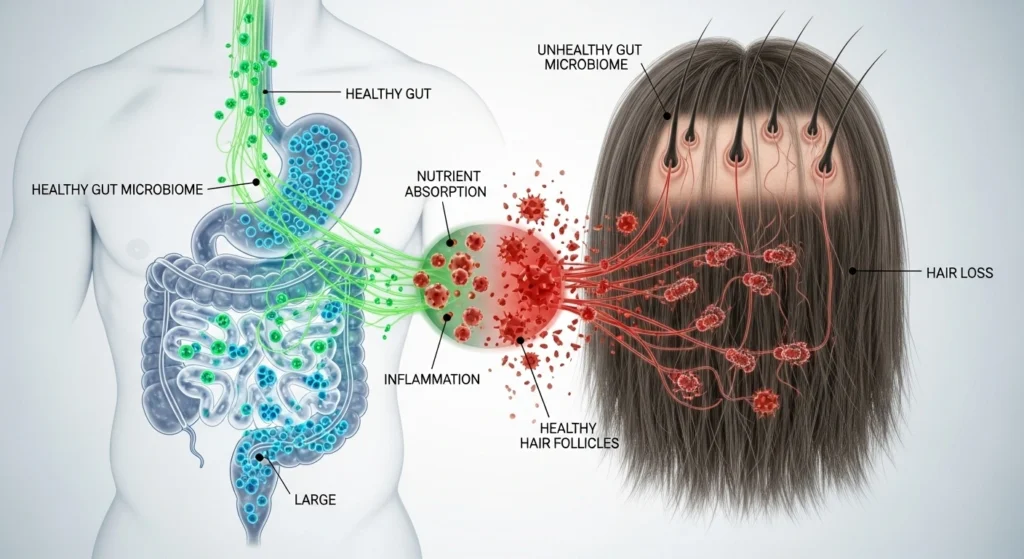Summary
Does Bad Gut Health Cause Hair Loss? Bad gut health can contribute to hair loss by disrupting nutrient absorption, causing inflammation, and affecting hormonal balance.
Improving gut health through a balanced diet, probiotics, and lifestyle changes can help restore nutrient absorption, reduce inflammation, and promote hair growth. Understanding the link between gut health and hair loss is key to preventing and managing hair thinning.
Introduction
If you’re struggling with hair loss and have ruled out common causes, you might want to consider your gut health. Does bad gut health cause hair loss? While it may seem surprising, your gut plays a vital role in overall health, including your hair.
Poor gut health can lead to nutrient deficiencies, hormonal imbalances, and inflammation factors that contribute to hair thinning and loss. In this post, we’ll explore the connection between gut health and hair, why it matters, and how improving gut health can help prevent hair loss.

The Link Between Gut Health and Hair Loss
Why Gut Health Matters for Hair Growth
Gut health has a profound impact on many aspects of your body, including your hair. The gut, often referred to as the “second brain,” is responsible for absorbing nutrients that are essential for healthy hair growth. A balanced gut ensures that the nutrients from food, such as vitamins and minerals, are properly absorbed into the bloodstream. When the gut is unhealthy, it can hinder nutrient absorption, leading to deficiencies that affect hair follicles.
Gut-Related Conditions Linked to Hair Loss
Several gut-related conditions can directly or indirectly contribute to hair loss:
- Leaky Gut: This condition occurs when the lining of the intestines becomes damaged, allowing toxins and undigested food particles to enter the bloodstream. This triggers an inflammatory response that may impact hair follicles and lead to hair loss.
- Irritable Bowel Syndrome (IBS): Individuals with IBS often experience inflammation in the gut, which can disrupt nutrient absorption and affect overall health, including hair.
- Celiac Disease: This autoimmune disorder damages the small intestine and impairs nutrient absorption, leading to deficiencies that could contribute to hair thinning.
How Bad Gut Health Can Lead to Hair Loss
Gut Dysbiosis and Its Impact on Hair Follicles
Gut dysbiosis refers to an imbalance of the gut microbiota, where harmful bacteria outnumber beneficial ones. This imbalance can cause inflammation in the gut, which often extends to the scalp, leading to poor hair follicle health. Studies suggest that an inflamed gut may disrupt the hair growth cycle, leading to conditions such as telogen effluvium, a form of hair shedding due to stress or imbalanced nutrition.
Nutrient Deficiency: A Major Culprit
A healthy gut is essential for the proper absorption of key nutrients that promote hair growth. When the gut is unhealthy, deficiencies in important vitamins and minerals such as biotin, iron, zinc, and vitamin D can develop. These nutrients are essential for the proper functioning of hair follicles, and their deficiency may result in hair thinning or shedding.
- Biotin: Vital for keratin production, biotin supports hair strength and growth.
- Iron: Deficiency in iron leads to anaemia, which can cause hair loss.
- Zinc: Important for tissue growth and repair, zinc also plays a role in hair cell regeneration.
Improving gut health can restore proper nutrient absorption, reversing deficiencies and promoting healthy hair growth.
Scientific Evidence Behind the Gut-Hair Loss Connection
Studies on the Gut-Hair Axis
Several studies suggest a direct relationship between gut health and hair loss. Research on the gut-brain-skin axis shows that an imbalance in gut bacteria can lead to systemic inflammation, which, in turn, impacts the scalp and hair follicles. Probiotic supplementation has shown promise in promoting hair growth by balancing gut flora and reducing inflammation, but more clinical trials are needed for conclusive evidence.
How to Improve Your Gut Health for Hair Growth
Dietary Changes to Restore Gut Balance
Improving gut health starts with a healthy diet rich in fibre, antioxidants, and probiotics. Foods like fermented vegetables, yoghurt, kimchi, and kombucha introduce beneficial bacteria to the gut, promoting a balanced microbiome. Fibre-rich foods, such as leafy greens and whole grains, support digestion and reduce inflammation in the gut.
Probiotics and Prebiotics: Key Players in Gut Health
Probiotics are live bacteria that support gut health, while prebiotics are fibre-based foods that feed these bacteria. Taking probiotic supplements or consuming prebiotic-rich foods like onions and garlic can help restore gut health, which may, in turn, improve hair growth.
Lifestyle Changes to Support Gut and Hair Health
Alongside dietary adjustments, lifestyle habits such as stress management, regular exercise, and adequate sleep contribute to both gut and hair health. Chronic stress is known to worsen gut issues, and it can also trigger hair loss through the overproduction of the stress hormone cortisol.
Expert Tips for Maintaining Gut Health and Preventing Hair Loss
Step-by-Step Guide to a Gut-Friendly Diet
A gut-friendly diet should include:
- Probiotic-rich foods: Yoghurt, kefir, sauerkraut
- Prebiotics: Garlic, onions, and bananas
- Fibre-rich foods: Leafy greens, berries, oats
This combination of foods helps reduce inflammation and improve gut flora, creating an environment conducive to hair growth.

Consultation with a Specialist
For those experiencing severe hair loss, it’s advisable to consult with a dermatologist or gastroenterologist for personalised treatment. They can run tests to identify underlying gut issues and recommend a tailored approach to improve gut health and prevent further hair loss.
How to Monitor Your Gut Health Progress
Tracking improvements in gut health can be done by keeping a food and symptom diary. Notice changes in digestion, skin health, and hair condition to gauge the effectiveness of dietary and lifestyle adjustments.
FAQs About Gut Health and Hair Loss
Q: Can improving my gut health stop hair loss?
Q: How long does it take to see results?
Q: Are there any supplements that can help with gut and hair health?
Take Control of Your Hair and Gut Health
If you’re concerned about hair loss and gut health, book a consultation with our specialists today to learn more about how you can improve both your gut and hair health. Don’t wait for hair loss to take over; take proactive steps to restore balance to your body.
Gut health is a critical factor in maintaining healthy hair. By understanding the connection between your gut and hair loss, you can take steps to restore balance and promote hair growth. Whether through dietary changes, probiotic supplementation, or lifestyle adjustments, improving gut health is a powerful tool in the fight against hair loss.
